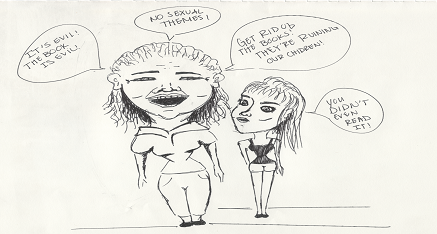LITERATURE: Recently, a Stephen King book was banned from a high school library for a rape scene, but one brave student helped to overturn it.
By Isabel De La Garza, Senior Writer
After a parent complaint, Stephen King’s Different Seasons, a non-horror anthology of four novellas, was removed from library shelves at Rocklin High School for containing one rape scene. The book was reviewed by a board of adults and one student and subsequently voted by all the committee members (minus the student) to be banned. The adults, however, never read the book completely before banning it. Only the student, Amanda Wong, had actually read the anthology cover-to-cover. Wong said that she “thought it was completely wrong of them to do that,” and though she understood the “parent’s concerns — I wouldn’t want my little brother reading this — I don’t believe it’s the school’s right to take the entire book out of [the] library just over that.” Thus, she appealed to the district and the ban was nullified. The book was placed back on shelves, where it will stay until a district-wide committee finishes reviewing the book and deciding whether or not it should be removed once more.
Choosing books for a school library does involve more thought than an ordinary public library. Public libraries are open to everyone so they should include as many books as possible to appeal to the broadest range of people; school libraries, on the other hand, must contain “age-appropriate” titles. This adds an element of difficulty to literary selections. In this case, however, the ban was far too strict and nonsensical. The book was banned for one instance of unsavory themes or situations. Literal and figurative rape scenes are sprinkled throughout literature in nearly every century from the Greco-Roman period (evident in many myths—Achilles’ back story for example), the 19th Century (literally in novels such as Tess of the d’Urbervilles, and figuratively in Frankenstein), the 20th century (figuratively in Lord of the Flies) and extending on into today (books such as Tortilla Curtain). Nearly all of these tales are often used as instructional tools; Greco-Roman myths and legends are taught from elementary school on up (although rape scenes and sexual themes are generally saved for high school). Frankenstein, Lord of the Flies and Tortilla Curtain are taught as core novels.
This does not mean that the books cannot be worked around. Many parents have conferences with teachers regarding books they are not comfortable with their children reading, and generally the outcome of such meetings is that the children will have an alternate book assigned to them by their literature or language arts teacher. Unlike a ban, this allows other students to still choose for themselves what they will read (and in some cases what teachers assign them), and does not inhibit them from discovering new ideas in order to avoid a few “graphic” scenes. This does not mean that books such as 50 Shades of Grey should not be banned. The school district and the school have the right to keep books of an overtly, graphically sexual and erotic nature off library shelves. In terms of books of merit or acclaim, however, students should have a choice.
The Girl with the Dragon Tattoo, for example, is banned at Poly for its “graphic” scenes (especially those of rape). The work as a whole, however, does have merit as a book that seeks to expose gender politics and injustice towards women in Swedish society and by association societies of the world in general. The Twilight series, however, despite its numerous sex scenes, the heroine’s persistent sexual and self-destructive nature, elements of pedophilia and lack of substantial good message of worth to inspire the youth or expose injustices, is housed in its entirety in the Poly High School library. Both examples are extremely popular titles for different reasons, thus it is not exactly fair to compare them in terms of which deserves to be in the library; however, both deal heavily with sexual themes and while one is an engaging read with an important message, the other is more of a novel of entertainment rather than enlightenment. The library technically should have novels of both type within it. Allowing Twilight as opposed to The Girl with the Dragon Tattoo is certainly unfair due to the fact that both have similar objectionable themes with similar amounts of focus and detail.
Schools and school districts must monitor book selections as most students are minors, but books should be banned only after serious consideration, as opposed to the Rocklin committee’s ban, which was based solely on the negative features of Different Seasons. Books allow students to learn, discover new ideas and improve their writing skills and vocabulary. Therefore, it is more detrimental to the educational system to not take the utmost care in selecting which books to remove from the system.

